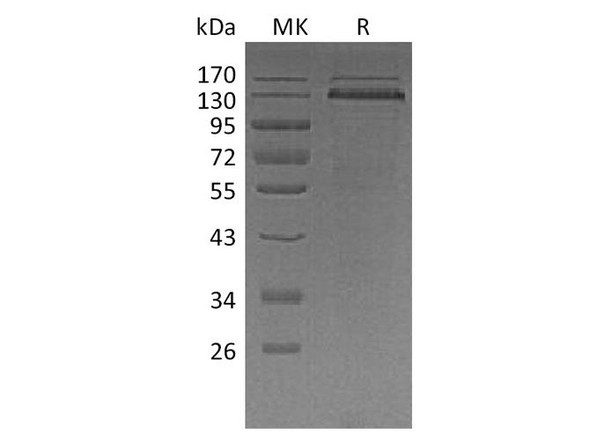Description
| Product Name: | Human THBS1 Recombinant Protein |
| Product Code: | RPPB4951 |
| Size: | 10µg |
| Species: | Human |
| Target: | THBS1 |
| Synonyms: | Thrombospondin-1, THBS1, TSP, TSP1, THBS, THBS-1. |
| Source: | Baculovirus Insect Cells |
| Physical Appearance: | Sterile Filtered clear solution. |
| Formulation: | The sterile protein solution contains 20mM Sodium phosphate, pH 6.0 and 300mM NaCl. |
| Stability: | Recombinant Human TSP should be stored between 2°C- 8°C. For long term storage it is recommended to add a carrier protein (0.1% HSA or BSA). |
| Purity: | Greater than 90.0% as determined by SDS-PAGE. |
Thrombospondin-1 (TSP1) is a member of the Thrombospondin family and is encoded by the gene THBS1 which is a subunit of a disulfide-linked homotrimeric protein. Thrombospondin-1 is an adhesive glycoprotein that mediates cell-to-cell and cell-to-matrix interactions. Thrombospondin-1 can bind to fibrinogen, fibronectin, laminin, type V collagen and integrins alpha-V/beta-1. TSP1 has been shown to play roles in platelet aggregation, angiogenesis, and tumorigenesis. TSP1 has been shown to be a natural inhibitor of neovascularization and tumorigenesis in healthy tissue. TSP1 interacts with no less than 12 cell adhesion receptors, including CD36, av integrins, b1 integrins, syndecan, and integrin-associated protein (IAP or CD47). It also interacts with various proteases involved in angiogenesis, including plasminogen, matrix metalloproteinase, thrombin, cathepsin, and elastase. Positive and negative modulation of endothelial cell adhesion, motility, and growth are attributed to TSP1. Recently, thrombospondin-1 was found to bind to the reelin receptors, ApoER2 and VLDLR, in so doing affecting neuronal migration in the rostral migratory stream.
Recombinant Human THBS1 is glycosylated with N-linked sugars and produced using baculovirus vectors in insect cells. Recombinant Human THBS1 is Reactive with A4.1 anti-TSP mAb and its Mw is 140,000 Dalton.
| UniProt Protein Function: | THBS1: Adhesive glycoprotein that mediates cell-to-cell and cell-to-matrix interactions. Binds heparin. May play a role in dentinogenesis and/or maintenance of dentin and dental pulp. Ligand for CD36 mediating antiangiogenic properties. Belongs to the thrombospondin family. |
| UniProt Protein Details: | Protein type:Motility/polarity/chemotaxis; Inhibitor Chromosomal Location of Human Ortholog: 15q15 Cellular Component: extracellular matrix; extracellular space; cell surface; sarcoplasmic reticulum; endoplasmic reticulum; endoplasmic reticulum lumen; fibrinogen complex; extracellular region; secretory granule; external side of plasma membrane Molecular Function:heparin binding; identical protein binding; laminin binding; calcium ion binding; integrin binding; protein binding; proteoglycan binding; fibroblast growth factor binding; transforming growth factor beta binding; phosphatidylserine binding; fibronectin binding; low-density lipoprotein binding; glycoprotein binding Biological Process: extracellular matrix organization and biogenesis; activation of MAPK activity; response to magnesium ion; negative regulation of fibrinolysis; response to glucose stimulus; cell adhesion; cell cycle arrest; positive regulation of macrophage activation; response to drug; platelet activation; negative regulation of interleukin-12 production; positive regulation of chemotaxis; positive regulation of blood vessel endothelial cell migration; response to testosterone stimulus; negative regulation of cell-matrix adhesion; negative regulation of blood vessel endothelial cell migration; response to unfolded protein; positive regulation of angiogenesis; response to mechanical stimulus; negative regulation of endothelial cell proliferation; peptide cross-linking; regulation of cGMP metabolic process; response to calcium ion; response to progesterone stimulus; negative regulation of apoptosis; positive regulation of blood coagulation; positive regulation of translation; negative regulation of fibroblast growth factor receptor signaling pathway; negative regulation of antigen processing and presentation of peptide or polysaccharide antigen via MHC class II; negative regulation of caspase activity; behavioral response to pain; platelet degranulation; positive regulation of tumor necrosis factor biosynthetic process; positive regulation of transforming growth factor-beta1 production; protein amino acid O-linked glycosylation; cell migration; chronic inflammatory response; negative regulation of focal adhesion formation; positive regulation of transforming growth factor beta receptor signaling pathway; engulfment of apoptotic cell; post-translational protein modification; positive regulation of protein kinase B signaling cascade; negative regulation of angiogenesis; cellular protein metabolic process; negative regulation of dendritic cell antigen processing and presentation; response to hypoxia; immune response; sprouting angiogenesis; blood coagulation; positive regulation of phosphorylation; positive regulation of cell migration |
| NCBI Summary: | The protein encoded by this gene is a subunit of a disulfide-linked homotrimeric protein. This protein is an adhesive glycoprotein that mediates cell-to-cell and cell-to-matrix interactions. This protein can bind to fibrinogen, fibronectin, laminin, type V collagen and integrins alpha-V/beta-1. This protein has been shown to play roles in platelet aggregation, angiogenesis, and tumorigenesis. [provided by RefSeq, Jul 2008] |
| UniProt Code: | P07996 |
| NCBI GenInfo Identifier: | 117949802 |
| NCBI Gene ID: | 7057 |
| NCBI Accession: | P07996.2 |
| UniProt Secondary Accession: | P07996,Q15667, Q59E99, A8K6H4, B4E3J7, B9EGH6, |
| UniProt Related Accession: | P07996 |
| Molecular Weight: | 120,148 Da |
| NCBI Full Name: | Thrombospondin-1 |
| NCBI Synonym Full Names: | thrombospondin 1 |
| NCBI Official Symbol: | THBS1�� |
| NCBI Official Synonym Symbols: | TSP; THBS; TSP1; TSP-1; THBS-1�� |
| NCBI Protein Information: | thrombospondin-1; thrombospondin-1p180 |
| UniProt Protein Name: | Thrombospondin-1 |
| Protein Family: | Thrombospondin |
| UniProt Gene Name: | THBS1�� |
| UniProt Entry Name: | TSP1_HUMAN |






